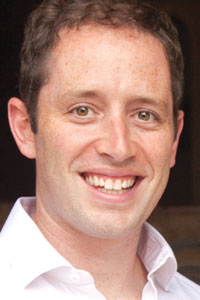Hal E. Hershfield
 Stern School of Business, New York University, USA
Stern School of Business, New York University, USA
http://people.stern.nyu.edu/hhershfi/
What does your research focus on?
Broadly, I study the ways that thinking about time can transform the emotions people feel and alter the judgments and decisions that they make. Within this framework, I have carried out two related lines of research. First, I study the role that considerations of the future play in guiding emotional experience and directing decision-making. In this vein, I have studied how an awareness of imminent endings (a) gives rise to a mixture of happiness and sadness and (b) directs one’s attention and even one’s gaze toward positive information. Further, I have found that looking ahead in time and feeling a sense of connection to one’s future self can impact long-term financial decision-making, converting a consumer into a saver. In my second line of research I examine the ways that reflections about the past can change investments in the present. Here, I study the ways that counterfactual reflection — or thoughts about what might have been rather than what was — fosters a greater sense of commitment to entities such as companies, countries, and important others.
What drew you to this line of research? Why is it exciting to you?
From the best literature to everyday conversations, people constantly try to make sense of what’s occurred in the past and what will eventually happen in the future. Gaining better insight into these varied cognitions, and the ways in which they impact decision-making, is one way to help improve well-being.
Who were/are your mentors or psychological influences?
In graduate school I was fortunate to work with Laura Carstensen and Brian Knutson at Stanford University, who collectively instilled in me a desire to tackle research questions that are not only exciting but that also matter to society, and Joseph Mikels was patient enough to show me how research actually gets done. During my post-doctoral fellowship at Northwestern University, Adam Galinsky, whose enthusiasm for research and experimental methods is infectious, taught me how to think more creatively about the problems I try to address; the possibly unattainable goal that I’ve now set out for myself is to one day match half his level of productivity. Finally, my thinking has been greatly sharpened over the last several years by my collaborations with Jeremy Bailenson (Stanford University), Dan Goldstein (London Business School and Yahoo Research Group), Derek Isaacowitz (Brandeis University), and Bill Sharpe (Stanford University).
To what do you attribute your success in the science?
If I had to consider myself successful (which truth be told, I don’t quite yet), I would attribute that success to the energetic, bright, and personable colleagues with whom I’ve worked. That and I’ve bought a program called “Freedom” which allows me to turn off the internet on my computer when I’m trying to write papers.
What’s your future research agenda?
I’d like to continue carrying out research that aims to better understand the ways that people conceive of their future selves, and how such conceptions affect a host of outcome variables. Ultimately, I would like to write a few review pieces that merge what my colleagues and I have learned about the self over time with the previous work that has been done in the domains of judgment and decision-making and social psychology.
Any advice for even younger psychological scientists? What would you tell someone just now entering graduate school or getting their PhD?
Never engage in social comparison. I would probably stop working out if I regularly compared myself to the strongest people at the gym. Similarly in graduate school, it’s crucial to focus on your own goals — and how easily you’re meeting them — rather than the progress that’s been made by others. I would also say that it is important not to get too excited or upset by the regular ups and downs that come with being an academic. There will always be datasets that work out really well and others that fail, but allowing your emotions to be too linked to these outcomes will make for an unstable and ultimately unsustainable graduate school career.
What publication are you most proud of or feel has been most important to your career?
Ersner-Hershfield, H., Wimmer, G. E., & Knutson, B. (2009). Neural evidence for self-continuity in temporal discounting. Social Cognitive and Affective Neuroscience, 4(1), 85-92.
I am most proud of this paper because it represents my first foray into understanding the relationship between thoughts about the future self and saving behavior. The fact that it was also an incredibly labor-intensive (but also fun) study to run made its eventual publication that much more rewarding.





APS regularly opens certain online articles for discussion on our website. Effective February 2021, you must be a logged-in APS member to post comments. By posting a comment, you agree to our Community Guidelines and the display of your profile information, including your name and affiliation. Any opinions, findings, conclusions, or recommendations present in article comments are those of the writers and do not necessarily reflect the views of APS or the article’s author. For more information, please see our Community Guidelines.
Please login with your APS account to comment.